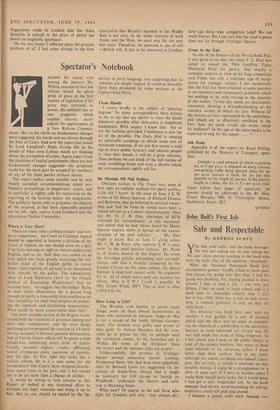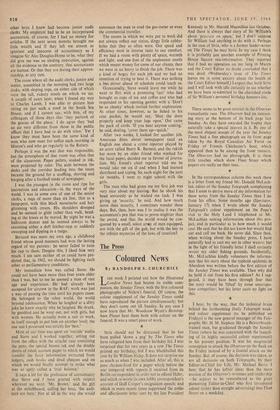John Bull's First Job
Safe and Respectable
By GEORGE SCOTT You bite your nails,' said the bank manager. He was not asking me, he was telling me. 'We can't have anyone working in the bank who bites his nails. Out of the question. Absolutely.'
What the National Provincial Bank lost, accountancy gained—briefly. I had no more posi- tive reason for going into that than I had for going into'banking, but, having decided to leave school, I had to find a job. I was only just fifteen, 1 had no need to leave school and it is hard now to remember exactly why I did, but it was 1940, there was a war on and, some- how, it seemed pointless to stay on into the sixth form.
'Do whatever you think best, son,' said my mother. I was guided by a sort of fatalism which told me there was no sense in consider- ing the chances of a scholarship to the university, because in some unnamed yet certain way the war had made that kind of thing irrelevant. So I left school and I went to the public library to read all the careers booklets. Not many of them were relevant to my situation, either. I knew better than their authors that in my town, although my school certificate was indeed a pass- port, the territory to which it admitted me was severely limited: I could be a draughtsman or a clerk of some sort. If I were to become either I could think myself fairly lucky, for it would mean I had got a safe, respectable job. As the bank manager had shown, notwithstanding the call-up, employers could still pick and choose.
I became a junior audit clerk because two other boys I knew had become junior audit clerks. My employer had to be an incorporated accountant, of course, for I had no money for articles. If the next seven months brought me little wealth and if they left me almost as ignorant and innocent of accountancy as I imagine Sir Alec Douglas-Home to be, what they did give me was an abiding conviction, against all the evidence to the contrary, that accountants are human. Or that they are during their appren- ticeship, at any rate.
The room where all the audit clerks, junior and senior, assembled in the morning had two large desks, with sloping tops, on either side of which were the tall, rickety stools on which we sat. A couple of years later, when 1 found my way to Charles Lamb, I was able to picture him sitting on just such a stool in the South Sea House, and if I cannot say, with him, of my colleagues of those days that 'they partook of the genius of the place,' I do agree they 'had an air very different from those in the public offices that I have had to do with since.' Yet I know they must have been the same kind of men who now meet for coffee each morning in Hinton's and who go regularly to the Rotary.
Perhaps it was the war that was responsible, but the atmosphere of that room was often that of the classroom. Paper pellets, soaked in ink, were projected by ruler. The aisle between the desks and the corridor leading into the room became the ground for a scuffling, shoving and barging after a football made of newspaper.
I was the youngest in the room and ripe for instruction and education—in the ways of the world. I was in some awe of one of the senior clerks, a man of more than six feet, thin as a lamp-post, with thin black moustache and hair glistening with cream. His shoulders drooped and he seemed to glide rather than walk, bend- ing at the knees as he moved. By night he was a ballroom dancer and he seemed always to be executing either a deft feather-step or suddenly swooping and dipping in a tango.
Bernard was more my own age, a childhood friend whose good manners had won the lasting regard of my parents: he never failed to raise his cap to them. Despite this, I liked hins very much. I am sure neither of us could have pre- dicted that, in 1962, we should be fighting each other as parliamentary candidates.
My immediate boss was called Steve. He could not have been more than four years older than I was, but to me he seemed a man of vast age and experience. He had already been accepted for aircrew in the RAF; work was just a way of passing the time until his papers came. He belonged to the other world, the world beyond adolescence. When he laughed at a dirty joke he knew exactly why he laughed. He drank, he gambled and he went out, not with girls, but with women. He actually wore a suit to work, in itself enough to put him on another level; the one suit I possessed was strictly for 'best.'
Most of our time was spent on 'outside' audits and Steve and I worked together, setting out from the office with the attaché case containing the pens, the special brown ink and the double sheets of ruled, account paper to which we would transfer the fusty information extracted from ledgers, cash books and dead cheques and on which we would finally attempt to strike what was so aptly called a `trial balance.'
It says a lot for the profession of accountancy that Steve and I were greeted with respect wherever we went. 'Mr. Brown,' said the girl at the switchboard, calling her boss, 'the audi- tors are here.' Not at all in the way she would announce the man to read the gas-meter or even the commercial traveller.
The rooms in which we were put to work did not always reflect our status, dingy little cubby- holes that they so often were. Our speed and efficiency were in inverse ratio to our comfort. If we had a room with plenty of space, warmth and light, and one free of the unpleasant smells which meant money for some of our clients, then we were in no hurry to finish the job. There was a kind of bogey for each job and we had no intention of trying to beat it. There was nothing a bus driver ahead of schedule could teach us.
Occasionally, Steve would leave me while he went to flirt with a promising 'tart' who had brought us cups of tea and coffee and who had responded to his opening gambit with a 'Don't be so cheeky' which invited further exploration. At other times, however, as he fished in his coat pocket, he would say, 'Shut the door properly and keep your lugs open.' Out came the pack of cards. 'If you hear anyone coming,' be said, dealing, 'cover them up—quick.'
After two weeks, I looked for another job. American films about newspapers (and an English one about a crime reporter played by an actor called Barry K. Barnes), and the rakish hat worn by an older friend who worked for the local paper, decided me in favour of journa- lism. -My friend's chief reporter told me he would take me on if and when I had learned shorthand and typing. So, each night for the next six months, I went to night school with the girls.
The man who had given me my first job was very nice about my leaving. But he shook his head anxiously as he wished me luck. I was giving up 'security,' he said. And how much more than security, I sometimes wonder these days. But, then, how was I to realise it was the accountant's pen that was to prove mightier than the sword, and that the world would be con- quered by a small, select army of men equipped, not with the gift of the gab, but with the key to the infinite mysteries of the laws of taxation?































 Previous page
Previous page